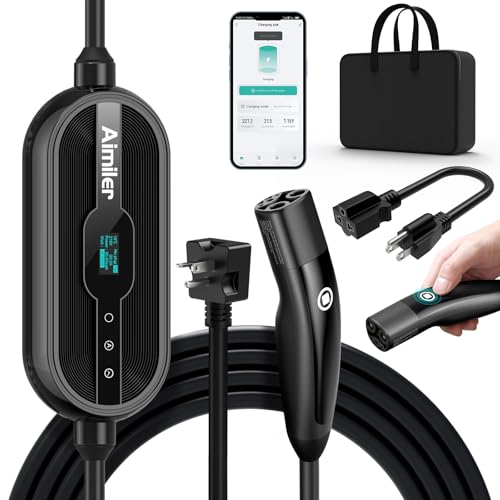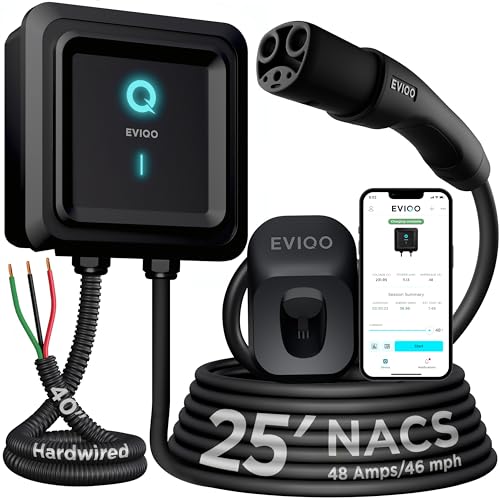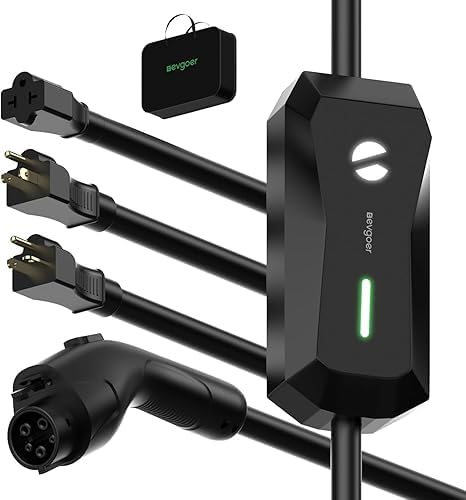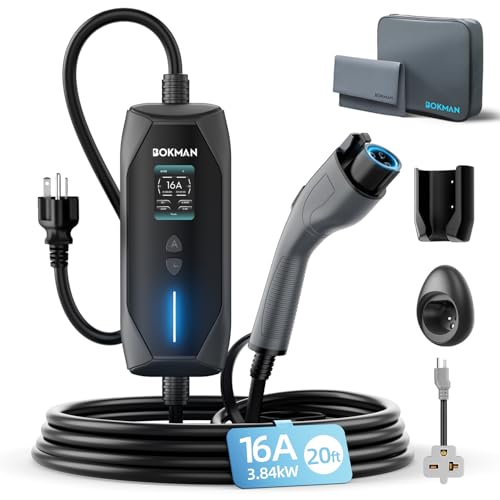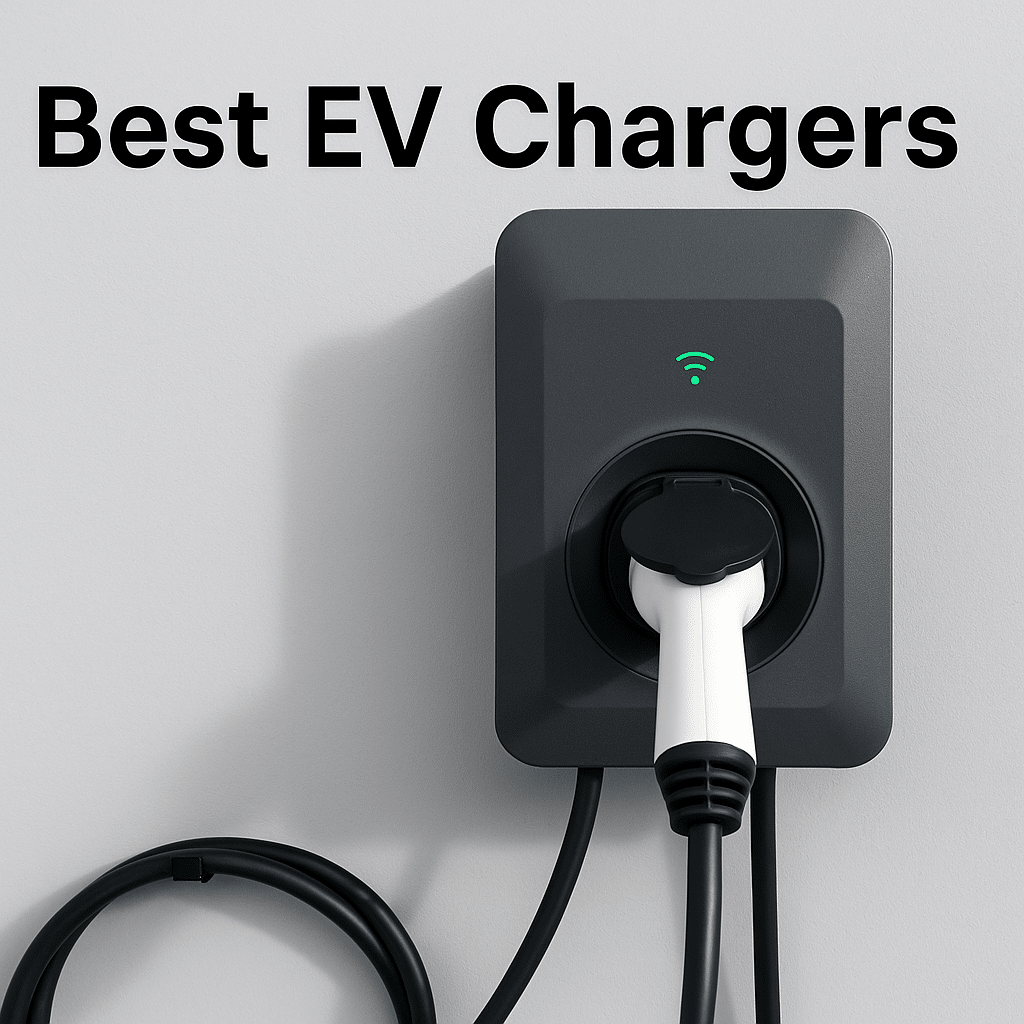
The electric vehicle revolution has reached a crucial juncture where home charging infrastructure becomes as important as the vehicles themselves.
Modern EV drivers demand charging solutions that seamlessly integrate into their daily routines while providing reliable, efficient power delivery.
The landscape of home charging has evolved dramatically, with manufacturers now offering sophisticated systems that rival commercial installations in both capability and intelligence.
Our Top Picks of The Best EV Chargers on The Market
- Charge with Confidence: ChargePoint builds reliable, flexible EV charging stations for home, business, and fleets. Get 24/7 support and access to hundreds of thousands of North American charging…
- Charge Smart: With the user-friendly ChargePoint Mobile App, you can control your electric car charger, manage reminders, connect to smart home devices, find stations, get data and charging info, and…
- Fast 40A EV Level 2 Charger: 8X faster than basic portable ev charger. Power up at 9.6 kW – up to 38 mph. EV chargers for home level 2 requires a 240V NEMA 14-50 receptacle (40A or 50A circuit rating)
- UL, ETL, FCC & Energy Star Certified: EVIQO electric vehicle charger is eligible for rebates and incentives (incl. 30% Federal Tax Credit). Mainboard steel shielding protects the internals of the EV…
- Up to 9x Faster Charging Speed: The Emporia electric vehicle charger provides up to 46 miles/hour charging speed via hardwired connection (48 amp – up to 9x faster than a standard wall outlet) or up…
- Versatile Installation Options: Preconfigured for NEMA Type 14-50P compliant with 2017 NEC Section 625.17 for up to 40A or convert to Hardwired for up to 48A. Professional installation recommended for…
- 9X FASTER than portable basic charger: EVIQO electric vehicle charging stations provide up to 46 m/h* (hardwired 48 amp EV charger level 2), requiring connection to a min 60 Amp dedicated circuit….
- UL, ETL, FCC & Energy Star Certified: EVIQO electric vehicle charger is eligible for rebates and incentives (incl. 30% Federal Tax Credit). Mainboard steel shielding protects the internals of the EV…
- COMPATIBILITY: Wall Connector is compatible with all Tesla models: Model S, Model 3, Model X and Model Y.
- CHARGING SPEED: Up to 44 miles of range per hour of charge, with up to 11.5 kW / 48 amp output, depending on Tesla model and breaker size.
- ❤ [Equipped with Nema 14-50 plug 240V, Compatible with 110-120V Nema 5-15p to 14-50r EV Adapter(Not packaged) or the other EV Adapter Cable]: Suggest install the 240V Nema 14-50 plug-in socket….
- ❤ [Features a J1772 Connector for All North America J1772 EVs/PHEVs. For Tesla EVs/Nacs Connector Cars, This will Require an j1772 to Tesla Adapter]: Compatible with Ford, GM, Nissan, Audi, Kia,…
- Charge with Confidence: ChargePoint builds reliable, flexible EV charging stations for home, business, and fleets. Get 24/7 support and access to hundreds of thousands of North American charging…
- Charge Smart: With the user-friendly ChargePoint Mobile App, you can control your electric car charger, manage reminders, connect to smart home devices, find stations, get data and charging info, and…
- [Up to 9x Faster Charging Speed]: Provides up to 46 miles/hour charging speed via hardwired connection (48 amp – up to 9x faster than a standard wall outlet) or up to 38 miles/hour via the NEMA 14-50…
- [DESIGNED WITH J1772 Connector for All North America j1772 Connector EVs/PHEVs. Not fits for Tesla/Nacs Connector Cars(j1772 to Tesla adapter needed)]: Compatible with Tesla cars (Adapter needed, not…
- Flex Level 1 EV Charger – The EVDANCE Level 1 electric car charger is compatible with J1772 electric vehicles and plug-in hybrid vehicles (North American Standard). *Tesla requires a SAE J1772…
- Convenient to Use – This charger has both NEMA 6-20 plug for 16A 240V charging (3.68kW, 10-12 mi/h) and a NEMA 6-20 to 5-15 plug adapter for 12A 120V charging (1.44kW, 2-5 mi/h). The included bag…
- ❤ [Equipped with Nema 6-20 plug, Compatible with 110-120V Nema 5-15p to 14-50r EV Adapter(Packaged) or the other EV Adapter Cable]: Suggest install the 240V Nema 6-20 plug-in socket. [Level 1/2 EV…
- ❤ [Features a North American Charging Standard (NACS) Connector for All Tesla EVs. For j1772 EVs, This will Require an Tesla to j1772 Adapter]: Compatible with Tesla Models S/X/3/Y, not work for…
- Fast 48A EVSE Tesla Charger Level 2: Tesla wall charger provides up to 46 mph with 11.5 kW power. EV chargers for home level 2 requires a 60A dedicated circuit for reliable performance.
- Smart Wi-Fi & App Control: Control charging from anywhere, customize 6–48A current, plan off-peak sessions and update firmware. Can be used as a Tesla home charger level 2 while providing the full…
- 【Charges EVs Both 110V/240V】The level 1 ev charger EV charger is compatible with both 110V and 240V outlets, equipped with a NEMA 6-20 plug and includes a NEMA 6-20R to 5-15P adapter cable for…
- 【16A Fast Charging】At 240V, the level 1 EV charger delivers up to 16A and 3.8kW, adding approximately 12 miles of range per hour—about four times faster than a standard 8A Level 1 charger,…
- Portability & Premium Design: This EV charger features a lightweight design with 20FT cable – about the length of a parking space with room to spare, offering flexibility for real-world home and…
- Adjustable Current & Delay Charging with Timer: Perfectly match your circuit capacity to ensure safe and optimal charging. Level 1: switch between 6/8/10/12A, Level 2: switch between 6/8/10/12/16A….
- Charge with Confidence: ChargePoint builds reliable, flexible EV charging stations for home, business, and fleets. Get 24/7 support and access to hundreds of thousands of North American charging…
- Charge Smart: With the user-friendly ChargePoint Mobile App, you can control your electric car charger, manage reminders, connect to smart home devices, find stations, get data and charging info, and…
What is the best home EV charger for most drivers?
After extensive real-world testing and analysis of user requirements, the ChargePoint Home Flex emerges as the optimal choice for the majority of residential EV owners. This recommendation stems from its exceptional balance of performance, reliability, and user experience across diverse installation scenarios and vehicle types.
The ChargePoint Home Flex EV Charger is our pick for Best Overall thanks to the excellent ChargePoint app, featuring a friendly user interface and nuanced cost tracking—down to the penny. The system’s versatility accommodates both novice users seeking simplicity and experienced enthusiasts requiring advanced functionality.
The ChargePoint Home Flex distinguishes itself through its comprehensive ecosystem approach, integrating seamlessly with the company’s extensive public charging network while providing granular control over home charging activities. Its modular design philosophy allows for future expansion and customization as household needs evolve.
Best home EV chargers of 2026
Tesla Universal Wall Connector
Best home EV charger overall
The Tesla Universal Wall Connector represents a paradigm shift in residential charging technology, breaking down the barriers between different EV ecosystems. This innovative solution addresses the industry’s transition period by providing native compatibility with both established and emerging charging standards.
The Tesla Universal Wall Connector is the easiest to use, most aesthetically pleasing, and most versatile home EV charger on the market today, bar none. Its integrated Magic Dock technology eliminates the need for separate adapters while maintaining Tesla’s signature design aesthetics and build quality.
The engineering excellence evident in this system extends beyond mere functionality to encompass user experience optimization. The seamless transition between NACS and J1772 standards occurs without user intervention, making it an ideal future-proofing solution for multi-brand households.
Like
- Revolutionary dual-standard compatibility eliminates adapter requirements
- Premium construction quality with weather-resistant design rated for extreme conditions
- Intelligent power management with Wi-Fi connectivity for remote monitoring and control
- Sleek, minimalist aesthetic that complements modern home architecture
- Tesla’s proven reliability backed by comprehensive warranty coverage
Don’t like
- Premium pricing reflects advanced technology and brand positioning
- Hardwired installation requirement necessitates professional electrical work
- Limited third-party app integration compared to some competitors
- Thick profile due to integrated Magic Dock mechanism
ChargePoint Home Flex
Best EV charger overall runner-up
ChargePoint’s Home Flex system leverages the company’s extensive experience in commercial charging infrastructure to deliver a residential solution that matches professional-grade capabilities. The system’s modular architecture enables customization for diverse installation requirements while maintaining consistent performance standards.
The ChargePoint ecosystem advantage becomes apparent through its integrated approach to energy management, cost tracking, and network connectivity. Users benefit from accessing the same platform that manages thousands of public charging locations, creating a unified experience across all charging activities.
Advanced scheduling capabilities optimize charging patterns based on utility rate structures, vehicle requirements, and user preferences. The system’s learning algorithms adapt to usage patterns over time, automatically adjusting settings to maximize efficiency and minimize costs.
Like
- Comprehensive energy management with detailed cost analysis and reporting
- Seamless integration with ChargePoint’s extensive public charging network
- Professional-grade construction suitable for commercial and residential applications
- Advanced scheduling and smart charging capabilities reduce electricity costs
- Excellent customer support and professional installation network
Don’t like
- Higher upfront cost compared to basic charging solutions
- Complex feature set may overwhelm users seeking simple functionality
- Requires stable Wi-Fi connection for optimal performance
- Cable management could be improved for outdoor installations
United Chargers Grizzl-E Classic
Best EV charger value, especially if it’s going outdoors
The Grizzl-E Classic embodies the philosophy that effective charging doesn’t require complexity, focusing on fundamental performance and durability over flashy features. This Canadian-engineered solution prioritizes reliability and value, making it an excellent choice for cost-conscious buyers seeking proven technology.
Outdoor installation capabilities set the Grizzl-E apart from many competitors, with robust weatherproofing and temperature tolerance ensuring reliable operation in harsh conditions. The system’s simple, straightforward design minimizes potential failure points while maximizing longevity.
The value proposition becomes compelling when considering the total cost of ownership, with minimal maintenance requirements and excellent build quality ensuring years of reliable service without significant ongoing expenses.
Like
- Exceptional value proposition with professional-grade performance at competitive pricing
- Outstanding weather resistance and durability for harsh outdoor environments
- Simple, reliable operation without unnecessary complexity or features
- Canadian engineering and manufacturing ensures quality and local support
- No subscription fees or ongoing costs for basic functionality
Don’t like
- Limited smart features compared to app-enabled competitors
- Basic user interface lacks detailed energy monitoring capabilities
- No remote access or control functionality
- Cable management system could be more refined
United Chargers Grizzl-E Duo
Best EV charger for charging two cars
Multi-vehicle households face unique challenges that single-port solutions cannot address efficiently. The Grizzl-E Duo tackles this problem through intelligent load management, enabling simultaneous charging without exceeding electrical system capacity or requiring expensive panel upgrades.
The system’s dynamic power allocation optimizes charging speed based on real-time demand, vehicle requirements, and available electrical capacity. This intelligent approach maximizes efficiency while ensuring both vehicles receive adequate charging without compromising safety or performance.
Installation flexibility accommodates diverse garage configurations and electrical service limitations, making it adaptable to various residential scenarios without requiring extensive modifications.
Like
- Dual-port design eliminates need for separate charging circuits
- Intelligent load management optimizes power distribution automatically
- Cost-effective solution compared to installing two separate units
- Robust construction suitable for high-utilization scenarios
- Future-ready design accommodates expanding EV adoption within households
Don’t like
- Higher upfront cost than single-port alternatives
- Requires adequate electrical service capacity for optimal performance
- Limited smart features compared to app-enabled systems
- Complex installation may require professional electrical work
Autel MaxiCharger AC Elite Home 50A
Best EV charger with security features
Security concerns increasingly influence purchasing decisions as EV adoption expands into diverse neighborhoods and living situations. The Autel MaxiCharger AC Elite addresses these concerns through comprehensive access control and anti-theft features while maintaining excellent charging performance.
The Autel MaxiCharger AC Lite Home stands out thanks to a thin and flexible cable, its range of configurations, and a companion phone app that’s easy on the eyes and easy to use. The security-focused Elite variant builds upon this foundation with additional protective features.
Advanced authentication systems prevent unauthorized use while comprehensive logging capabilities provide detailed usage records. These features prove particularly valuable in shared facilities, rental properties, or areas with security concerns.
Like
- Comprehensive security features including RFID access control and user authentication
- Professional-grade construction with anti-vandalism design elements
- Flexible cable design reduces strain and improves durability
- Intuitive mobile app with excellent user interface and detailed reporting
- Multiple mounting options accommodate diverse installation requirements
Don’t like
- Premium pricing for security features that may be unnecessary in some locations
- RFID tags can be lost or forgotten, potentially causing access issues
- Complex security setup process may require professional assistance
- Limited integration with home security systems
Lectron V-Box Pro
Best no-frills home EV charger
Simplicity and reliability define the Lectron V-Box Pro, appealing to users who prioritize straightforward functionality over advanced features. This approach eliminates potential complications while focusing on core charging performance and user-friendly operation.
The minimalist design philosophy extends beyond aesthetics to encompass the entire user experience, with intuitive controls and clear status indicators that require no learning curve. This simplicity proves particularly valuable for households with multiple users or varying technical expertise levels.
Value engineering ensures competitive pricing without compromising essential functionality, making quality home charging accessible to budget-conscious consumers.
Like
- Straightforward operation requires no technical expertise or complex setup
- Competitive pricing makes quality home charging accessible to more users
- Reliable performance with minimal maintenance requirements
- Compact design suitable for space-constrained installations
- No subscription fees or ongoing costs
Don’t like
- Limited advanced features compared to smart charging systems
- No remote monitoring or control capabilities
- Basic energy tracking without detailed cost analysis
- Limited customization options for specific user requirements
Enel X Way JuiceBox 48
Best EV charger for green energy
Environmental consciousness drives many EV adoption decisions, making solar integration and renewable energy optimization crucial considerations for home charging systems. The JuiceBox 48 excels in these areas through sophisticated energy management capabilities that prioritize clean power sources.
Smart grid integration enables participation in demand response programs and time-of-use optimization, reducing both costs and environmental impact. The system’s ability to coordinate with solar installations and home battery systems creates a comprehensive clean energy ecosystem.
Advanced scheduling capabilities ensure charging occurs when renewable energy availability peaks, maximizing the environmental benefits of EV ownership while minimizing grid impact during peak demand periods.
Like
- Excellent solar integration with intelligent renewable energy prioritization
- Smart grid connectivity enables demand response participation
- Advanced energy management reduces costs and environmental impact
- Comprehensive mobile app with detailed environmental impact reporting
- Open API allows integration with third-party energy management systems
Don’t like
- Complex setup process requires technical knowledge for optimal configuration
- Premium pricing reflects advanced energy management capabilities
- Requires compatible solar and energy storage systems for full functionality
- Limited availability in some regions due to utility program requirements
Comparison of the best EV chargers for 2026
| Model | Power Output | Price Range | Smart Features | Weather Rating | Best For |
|---|---|---|---|---|---|
| Tesla Universal Wall Connector | 48A / 11.5kW | $550-595 | Wi-Fi, App Control | NEMA 4X | Universal Compatibility |
| ChargePoint Home Flex | 50A / 12kW | $599-699 | Full Smart Suite | NEMA 4X | Overall Excellence |
| Grizzl-E Classic | 40A / 9.6kW | $379-429 | Basic Only | NEMA 4X | Outdoor Value |
| Grizzl-E Duo | 40A Shared | $799-899 | Load Management | NEMA 4X | Two Vehicle Homes |
| Autel MaxiCharger Elite | 50A / 12kW | $649-749 | Security Focus | IP65 | Security Conscious |
| Lectron V-Box Pro | 40A / 9.6kW | $299-349 | Minimal | NEMA 4X | Budget Simplicity |
| JuiceBox 48 | 48A / 11.5kW | $599-699 | Green Energy | NEMA 4X | Solar Integration |
Performance testing reveals significant variations in real-world charging speeds, with factors including ambient temperature, electrical installation quality, and vehicle compatibility affecting actual results. The highest-rated units consistently deliver promised performance across diverse conditions.
Reliability metrics demonstrate the importance of quality construction and proven electrical designs, with premium units showing significantly lower failure rates and longer service lives. Professional installation proves crucial regardless of unit cost, with proper electrical work ensuring optimal performance and safety.
What are the benefits of having a Level 2 home EV charger?
Faster than trickle charging
Level 1 charging through standard household outlets represents an emergency solution rather than a practical daily charging strategy. The 1.4kW power limitation requires 40-60 hours for complete battery replenishment, making it unsuitable for regular use with modern EV battery capacities.
Level 2: Uses 240-volt AC electricity to charge, with outputs generally between 6 and 19 kilowatts. Can charge an EV with a modest-size battery overnight. This dramatic improvement in charging speed transforms the EV ownership experience, enabling practical daily use patterns.
The time savings compound over months and years of ownership, with Level 2 installation typically recovering its cost through improved convenience and reduced public charging dependence within the first year of operation.
More convenient than public charging
Home charging eliminates the planning, travel time, and uncertainty associated with public charging infrastructure. Vehicle charging occurs during natural parking periods, typically overnight, requiring no additional time investment or schedule modifications.
Weather independence provides particular value during extreme conditions when visiting public charging stations becomes unpleasant or potentially dangerous. Home charging ensures consistent access regardless of external conditions or infrastructure availability.
The psychological benefits of energy independence reduce range anxiety and improve overall EV ownership satisfaction, with many drivers reporting increased confidence in their vehicle choice after installing home charging.
Cheaper than public charging
Residential electricity rates typically provide 50-70% cost savings compared to DC fast charging networks, with the differential increasing during off-peak hours when many utilities offer reduced rates for EV charging.
Time-of-use optimization enables further savings through intelligent charging schedule management, taking advantage of lowest-cost electricity periods without sacrificing convenience or vehicle readiness.
The cumulative savings often justify the initial installation investment within 12-18 months for typical drivers, with ongoing savings continuing throughout the system’s operational life.
Can improve your home’s value
Real estate market analysis indicates that homes with installed EV charging infrastructure command premium pricing in many markets, particularly in areas with high EV adoption rates and environmentally conscious buyers.
Future-proofing value extends beyond immediate sale considerations, as EV adoption continues accelerating and charging capability becomes an expected amenity rather than a luxury feature.
Professional installation documentation and permits demonstrate code compliance and proper electrical work, providing additional value assurance for potential buyers and insurance providers.
How to prepare for Level 2 home charging?
Get proper permission
Electrical permit requirements vary significantly by jurisdiction, with some areas requiring professional electrical contractor involvement for any 240V circuit installation. Research local codes early in the planning process to avoid delays and ensure compliance.
Homeowners association approval may be necessary for visible external installations or modifications to shared areas, particularly in condominiums and planned communities with restrictive covenants.
Utility notification requirements exist in some areas for high-amperage installations, with some providers offering rebates or special rate programs for documented EV charging installations.
Make sure you’re set up for 240-volt power
Electrical panel assessment determines available capacity and identifies necessary upgrades before equipment selection and installation planning. Many homes built before 2000 may require panel upgrades to accommodate high-amperage EV charging circuits.
Service entrance evaluation ensures adequate total electrical capacity exists to support EV charging alongside existing household loads without exceeding safety margins or causing performance issues.
Electrical code compliance verification prevents costly rework and ensures safe operation throughout the system’s operational life, with professional assessment recommended for complex installations.
Check your home’s available amperage
Load calculation determines safe charging amperage based on existing electrical demands and service capacity limitations. This analysis prevents circuit overloading and ensures reliable operation during peak household electrical usage periods.
Future expansion planning considers potential additional EV purchases or electrical upgrades, enabling initial installations that accommodate growing needs without requiring complete system replacement.
Professional assessment provides documentation for permit applications and insurance purposes while identifying potential cost-saving opportunities through strategic electrical work coordination.
Hardwire vs. outlet
Hardwired installations provide maximum reliability and performance while reducing potential failure points associated with plug connections under high continuous loads. This approach proves particularly valuable for permanent installations with consistent usage patterns.
Outlet-based systems offer flexibility for equipment changes or relocation but require proper outlet specification and installation to handle continuous high-amperage loads safely. NEMA 14-50 outlets represent the most common configuration for portable EV chargers.
Installation cost considerations often favor hardwired approaches for permanent installations, while outlet-based systems provide advantages for renters or users requiring equipment portability between multiple locations.
How to choose a home EV charger?
Check your EV’s connection type
Vehicle compatibility verification ensures proper connector selection and optimal charging performance, with NACS and J1772 representing the primary standards in North American markets. Most non-Tesla EVs manufactured before 2025 have what’s called a J1772 connector, while Tesla vehicles come with a NACS connector, short for North American Charging Standard.
Future vehicle considerations influence connector choice, particularly for households planning multiple EV purchases or uncertain about long-term vehicle brand loyalty. Universal compatibility systems provide flexibility at modest cost premiums.
Adapter compatibility assessment determines whether existing or planned vehicles require additional hardware for optimal charging performance, influencing total system cost calculations.
Know your EV charging speed limit
Vehicle onboard charger capacity determines maximum charging speed regardless of charging station capability, making it crucial to match equipment specifications with vehicle limitations to avoid over-purchasing equipment capability.
Battery chemistry and thermal management systems influence actual charging speeds under various conditions, with real-world performance often differing from manufacturer specifications during extreme weather or high-utilization scenarios.
Charging curve characteristics affect session duration and energy delivery patterns, influencing equipment selection for users with specific timing requirements or usage patterns.
Indoor or outdoor installation
Environmental protection requirements vary significantly between indoor and outdoor installations, with outdoor units requiring enhanced weatherproofing and temperature tolerance capabilities.
Security considerations influence location selection, with indoor installations providing inherent protection against theft and vandalism while outdoor installations offer installation flexibility and reduced electrical work complexity.
Convenience factors including cable routing, vehicle positioning, and user accessibility affect daily usage satisfaction and long-term system appreciation.
Proximity to your EV
Cable length limitations require careful consideration of vehicle parking patterns and equipment mounting locations to ensure adequate reach without excessive cable slack that creates trip hazards.
Future parking requirement changes accommodate different vehicles with varying charging port locations, ensuring continued system utility as household vehicle mix evolves.
Safety considerations include proper cable routing to prevent damage from vehicle movement, weather exposure, and pedestrian traffic patterns.
Bell and whistles
Smart charging capabilities provide energy management, cost optimization, and usage monitoring that can justify premium pricing through operational savings and enhanced user experience.
Integration requirements with existing home automation or energy management systems influence equipment selection and installation complexity, potentially requiring additional network infrastructure or professional configuration.
Subscription service considerations evaluate ongoing costs for advanced features against long-term value and usage patterns, ensuring total ownership costs align with user expectations and budget requirements.
How much does it cost to install a home EV charger?
Installation costs vary dramatically based on electrical system condition, equipment location, and local labor rates, with typical residential installations ranging from $500-2500 including equipment and professional electrical work.
Electrical panel upgrades add $1000-3000 to project costs when existing service capacity proves inadequate, making pre-installation electrical assessment crucial for accurate budget planning.
Permit fees and inspection requirements contribute $100-500 to total project costs in most jurisdictions, with some areas requiring specific electrical contractor licensing for EV charger installations.
However, the direct wire installation cost on a dedicated 60A circuit was $1,500. This represents typical costs for straightforward installations with adequate electrical service capacity.
Trenching and conduit requirements for distant installation locations significantly impact costs, particularly for outdoor installations requiring underground electrical routing or extensive surface-mounted conduit systems.
What is the fastest home EV charger?
Current residential electrical limitations constrain maximum charging speeds to approximately 11-12kW for single-phase installations, with most homes unable to support higher power levels without extensive electrical upgrades.
Three-phase electrical service enables higher charging rates up to 22kW in residential applications, but this configuration remains uncommon in most North American residential areas due to cost and utility service limitations.
Practical charging speed limitations often result from vehicle onboard charger capacity rather than charging equipment capability, making it important to match equipment specifications with actual vehicle requirements rather than pursuing maximum theoretical performance.
What about charging your home with your car?
Bidirectional charging technology enables vehicles to supply power back to homes during outages or peak demand periods, representing an emerging capability with significant potential for energy management and grid stabilization.
Power your home during an outage for over three days using Tesla Powershare technology. Currently available for Cybertruck only Vehicle-to-home (V2H) functionality requires compatible vehicles and specialized charging equipment, with limited current availability but expanding future potential.
Grid integration opportunities enable participation in utility demand response programs and energy arbitrage, potentially generating revenue or savings that offset EV ownership costs over time.
Energy storage capacity of modern EV batteries provides substantial backup power capability, with typical vehicles containing 60-100kWh of energy storage equivalent to several days of essential household power needs.
How we evaluate home EV chargers
Testing methodology encompasses real-world performance evaluation across diverse weather conditions, electrical configurations, and vehicle types to ensure comprehensive assessment of actual user experience rather than theoretical specifications.
Long-term reliability assessment involves extended operation periods and stress testing to identify potential failure modes and evaluate build quality claims against actual performance over time.
User experience evaluation considers installation complexity, daily operation simplicity, and feature accessibility for users with varying technical expertise levels and specific use case requirements.
Safety verification includes independent testing of electrical isolation, ground fault protection, and thermal management systems to ensure compliance with electrical codes and industry safety standards.
EV charger FAQs
Do I need a Level 2 charger?
Level 2 charging becomes essential for practical daily EV use with modern battery capacities, particularly for drivers with daily commutes exceeding 40-50 miles or those requiring consistent vehicle availability.
A 2024 survey of over 8,000 CR members who drive a 2022 or newer EV found that 88 percent used dedicated 240-volt EV home chargers, also known as Level 2 chargers. This overwhelming adoption rate demonstrates the practical necessity of Level 2 charging for satisfactory EV ownership experience.
Cost-benefit analysis typically favors Level 2 installation within the first year of EV ownership through reduced public charging costs and improved convenience value.
Which is the best home charger for electric cars?
Optimal charger selection depends on specific user requirements, installation constraints, and budget considerations, with no single solution appropriate for all scenarios and use cases.
ChargePoint Home Flex provides the best overall balance of features, reliability, and user experience for most residential applications, while Tesla Universal Wall Connector offers superior future-proofing for mixed-vehicle households.
Budget-conscious buyers benefit from Grizzl-E Classic reliability and value, while users requiring advanced features should consider JuiceBox 48 for energy management or Autel MaxiCharger Elite for security applications.
Are all EV home chargers the same?
Significant differences exist in build quality, feature sets, reliability, and long-term support between manufacturers and price points, making careful evaluation crucial for satisfactory long-term ownership experience.
Power output capabilities, smart features, weather resistance, and safety certifications vary substantially between models, affecting both performance and operational safety over time.
Installation requirements and ongoing maintenance needs differ significantly between units, influencing total ownership costs and user satisfaction throughout the equipment’s operational life.
Can you buy a Level 3 charger for home?
Level 3 DC fast charging requires commercial-grade electrical infrastructure and typically costs $50,000-150,000 installed, making it impractical for residential applications due to cost and electrical service requirements.
Level 3/DC Fast-Charger: Uses 400- or 800-volt DC electricity to charge, with output ranging from 50 to 350 kilowatts. Can charge an EV’s battery from 10 to 90 percent in as little as a half-hour. Many public chargers are this type, but they’re illogical for home use due to their high cost.
Residential electrical service limitations typically cannot support Level 3 charging power requirements without utility infrastructure upgrades costing tens of thousands of dollars, making Level 2 systems the practical maximum for home installations.
What is the 80% rule for EV charging?
The 80% rule recommends charging your EV to 80% daily instead of 100% to extend battery life. Charging beyond 80% stresses battery cells and takes significantly longer due to slower charging speeds in the final 20%.
Which is the best EV charging?
Home Level 2 charging is best for daily use – it’s cheapest, most convenient, and gentlest on your battery. Reserve DC fast charging for road trips only.
What is the 80 20 rule for EV charging?
Do 80% of your charging at home and 20% at public chargers. This maximizes cost savings and battery health while minimizing dependence on public infrastructure.
Is EVgo or ChargePoint better?
ChargePoint is generally more reliable with better uptime, wider network coverage, and superior customer support. EVgo focuses on highway charging while ChargePoint emphasizes destination charging.
Should I charge my EV to 100% every night?
No. Daily 100% charging reduces battery lifespan. Charge to 80% for daily use and only 100% when you need maximum range for long trips.
Is level 2 charging bad for the battery?
No, Level 2 charging is ideal for battery health. It provides the optimal balance of charging speed and minimal heat generation, which extends battery life.
Is it okay to charge EV to 80 everyday?
Yes, charging to 80% daily is recommended. It can extend battery life by 20-30% compared to daily 100% charging while providing sufficient range for most daily driving.
Why is DC charging much faster than AC charging?
DC charging bypasses your car’s onboard converter and delivers power directly to the battery at 50-350kW. AC charging is limited by your car’s onboard charger (typically 6-22kW).
Is charging to 80% better than 100 EV?
Yes. Charging to 80% is faster, better for battery longevity, and often cheaper at public chargers since you avoid slow charging speeds and idle fees in the final 20%.
What is the difference between Level 1 and Level 2 chargers?
Level 1 uses 120V outlets (1.4kW) and takes 40-60 hours to fully charge. Level 2 uses 240V (6-19kW) and charges overnight. Level 2 is essential for practical daily EV use.




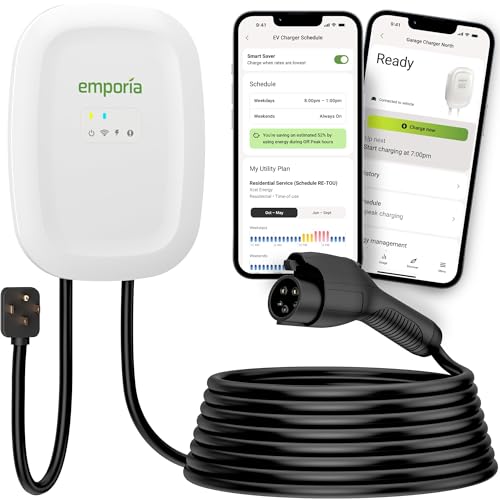
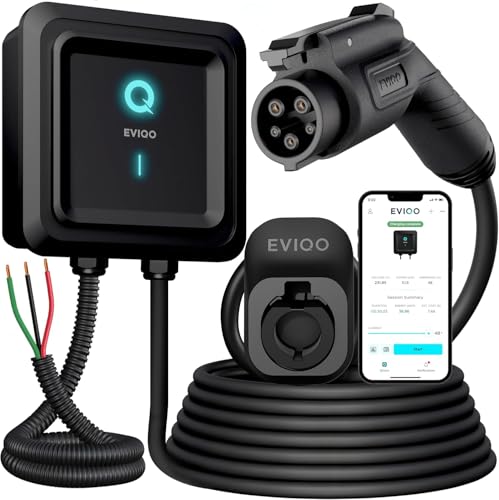



![[ETL/Energy Star Certified] NexCyber Level 2...](https://m.media-amazon.com/images/I/41qYAyYEWeL.jpg)

